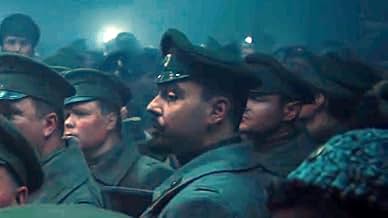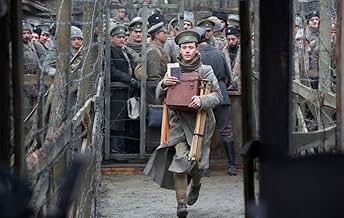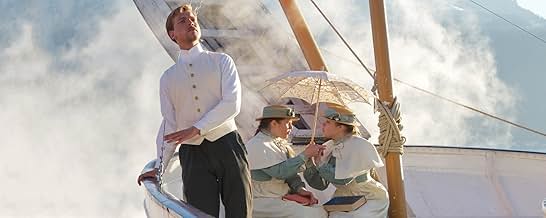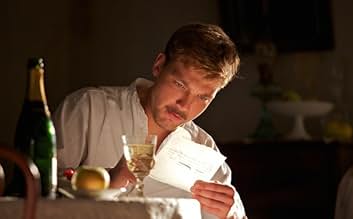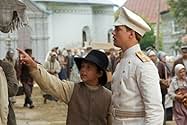Solnechnyy udar
- 2014
- 2 Std. 55 Min.
IMDb-BEWERTUNG
5,8/10
1227
IHRE BEWERTUNG
Füge eine Handlung in deiner Sprache hinzuOfficers of the White Army, holding as POWs in a Red Army's camp, try to understand why they lose Civil War and lost the Russian Empire at all.Officers of the White Army, holding as POWs in a Red Army's camp, try to understand why they lose Civil War and lost the Russian Empire at all.Officers of the White Army, holding as POWs in a Red Army's camp, try to understand why they lose Civil War and lost the Russian Empire at all.
- Auszeichnungen
- 6 Gewinne & 3 Nominierungen insgesamt
Martins Kalita
- Poruchik
- (as Martinsh Kalita)
Empfohlene Bewertungen
I won't give away the "key" -- that's for the viewer to discover -- but until I figured it out for myself, about 2/3 of the way through, I was so exasperated by this movie that I was tempted to just give up on it and quit. I thought it was incoherent and disjointed, and actually got peeved since I thought it was screwing with me.
But THEN... I figured out who/what the young officer in white, and the various appearances of the attractive woman, represented... and my whole experience changed. By the end of the movie, I was devastated. The lingering final image and text -- and the song sung over it -- left me trembling and weeping. The whole thing haunted me for days, then weeks, afterward.
I intend to watch it again from the beginning, now that I know what it's about. But I am waiting a bit, since I still haven't recovered from that first experience.
This is a very different kind of movie. It's NOT a straight story/narrative, and expecting such will just leave you frustrated. Mikhalkov is a sort of poet, who has used seemingly unconnected images to evoke feelings and impressions. He uses visual/emotional images to conceal deep realities of history. And, for this viewer at least, realities of humanity in general. For though the movie is concerned with 20th-century Russia/USSR, it speaks to me, as an American in 2022, of a more general truth, one we should all take to heart as our own glittering Western consumer culture heads for collapse: Concealed beneath superficially beautiful things (and hoo-boy, are the "in-color" parts of this movie a sensual feast for the eyes!) can lie the ugliest horrors of which humans are capable.
But THEN... I figured out who/what the young officer in white, and the various appearances of the attractive woman, represented... and my whole experience changed. By the end of the movie, I was devastated. The lingering final image and text -- and the song sung over it -- left me trembling and weeping. The whole thing haunted me for days, then weeks, afterward.
I intend to watch it again from the beginning, now that I know what it's about. But I am waiting a bit, since I still haven't recovered from that first experience.
This is a very different kind of movie. It's NOT a straight story/narrative, and expecting such will just leave you frustrated. Mikhalkov is a sort of poet, who has used seemingly unconnected images to evoke feelings and impressions. He uses visual/emotional images to conceal deep realities of history. And, for this viewer at least, realities of humanity in general. For though the movie is concerned with 20th-century Russia/USSR, it speaks to me, as an American in 2022, of a more general truth, one we should all take to heart as our own glittering Western consumer culture heads for collapse: Concealed beneath superficially beautiful things (and hoo-boy, are the "in-color" parts of this movie a sensual feast for the eyes!) can lie the ugliest horrors of which humans are capable.
To my mind, it's one of greatest movies in this century. It's about man's tragedy in personal life and death of his country. He asks again and again in the first scene of this film: how this happened? The answer is: each of us influence history (as I understand this) - our actions, even thoughts and desires, Main hero (Poruchik - Martinsh Kalita) is indifferent about all except his individual desire. He can't make the right choice in his love and he can't come round until the moment of his death. It's too late for him, too late for his homeland. Bt film isn't didactic, this movie has exceptional artistic values. Director Nikita Mikhalkov knows enormous number of sophisticated nuances of human soul as professional secrets of cinema. The artistic result is outstanding. The cast is very successful, music is very touching, photography is splendid. Mikhalkov's enemies tries to denigrate him very hard. But it's method of communists and fascists - to assess art in politic terms. Everybody has rights to reject political views of Mikhalkov. But reject the great art of politic isn't democracy, it's totalitarianism. "Sunstroke" contains nothing denying human rights, humanism, etc.
How can you include the magnitude of the beauty, cinematography, sweeping epic settings, historical detail, artistic touches, acting nuances, and encompass the soul of the Russian experience? This director has done so with this movie. From Eisenstein's stairway scene, to peasant life touches, to the death of aristocratic Russia, the rise of automatomic socialism, timeless romance and human connection, he covers it all with in depth captures of each moment in detail. I have watched thousands of movies. The masterpieces stand out, the movies that perfectly express a point of view, a story, an idea, a character, or the actor becomes the character so convincingly that the movie becomes a classic. Sunstroke is a masterpiece-Bravo.
10cdrpsu
...for this beautiful and well-woven film. Stunning cinematography, beautifully subtle acting, and a great telling of a side of the Russian revolution unknown to most western audiences. One of those movies where you remember almost every scene.
By the way, the illicit love affair is the most well-done scene of it's type I've ever seen. Not only you you feel the different passions, you understand them.
And the second viewing is even more enjoyable than the first.
I purchased and will watch many times.
By the way, the illicit love affair is the most well-done scene of it's type I've ever seen. Not only you you feel the different passions, you understand them.
And the second viewing is even more enjoyable than the first.
I purchased and will watch many times.
Drags on and on and onnnnn. No reason for this to have been a three hour movie. The storyline of the tragic fate of Menshevik/White Army prisoners during the 1920 Red Terror is diminished by the lead character's recurring, saccharine reminiscences of a one night stand in 1907. That plot line could have been reduced to three short memory flashbacks and been just as effective. The war plot line suffered, as it was not given enough depth; unless you really know your Russian history, the nuances of who the prisoners are, what this mixed group of officers, soldiers and Cossacks represents is otherwise lost on the viewer. A single poignant gesture by one of the Bolshevik characters has no meaning, based on how this story has been told, alone. Three hours. Three hours of predictability. And Sunstroke? Yes, we get it - you did Burnt by the Sun. Bravo. Too bad about this latest effort, Nikita.
Wusstest du schon
- WissenswertesThe film was selected as the Russian entry for the Best Foreign Language Film at the 88th Academy Awards but it was not nominated.
- VerbindungenFeatured in Vecherniy Urgant: Nikita Mikhalkov/Viktoriya Solovyova (2014)
- SoundtracksNe dlya menya
Music by Nikolay Devitte
Lyrics by A. Molchanov
Performed by Nikita Mikhalkov and State Academic Kuban Cossack Choir
Top-Auswahl
Melde dich zum Bewerten an und greife auf die Watchlist für personalisierte Empfehlungen zu.
- How long is Sunstroke?Powered by Alexa
Details
Box Office
- Weltweiter Bruttoertrag
- 1.679.843 $
- Laufzeit2 Stunden 55 Minuten
- Farbe
- Sound-Mix
- Seitenverhältnis
- 2.35 : 1
Zu dieser Seite beitragen
Bearbeitung vorschlagen oder fehlenden Inhalt hinzufügen

Oberste Lücke
By what name was Solnechnyy udar (2014) officially released in India in English?
Antwort

